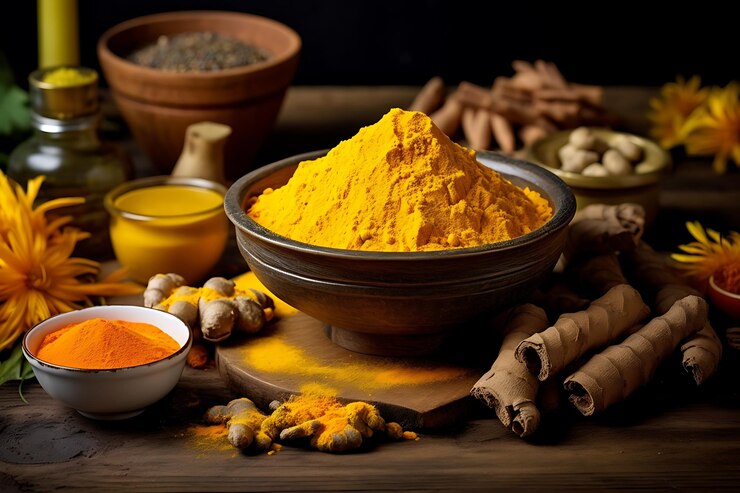The Golden Goodness Unveiling the Turmeric Benefits You Need to Know. Turmeric, the vibrant yellow spice that adds warmth and depth to curries and countless dishes, boasts a reputation for being more than just a culinary delight. For centuries, turmeric has been a mainstay in traditional medicine systems like Ayurveda, and recent scientific research is increasingly backing up its potential health benefits. So, what exactly makes this golden root so special? Let’s delve into the world of turmeric benefits and explore how this wonder spice might enhance your well-being.
Turmeric Benefits: A Powerhouse of Anti-Inflammatory Properties
One of the most well-researched aspects of turmeric is its potent anti-inflammatory properties. Inflammation, while a natural response to injury or infection, can become chronic and contribute to various health issues. Curcumin, the active compound in turmeric, is believed to be the key player in this fight against inflammation. Studies suggest that curcumin can work by blocking inflammatory pathways in the body, potentially offering relief for conditions like osteoarthritis, rheumatoid arthritis, and inflammatory bowel disease [1].
Here’s a real-life example: Imagine getting a nasty sprain from playing a sport. The inflammation causes pain, swelling, and stiffness. Including turmeric in your diet or taking a curcumin supplement (with proper guidance from a healthcare professional) might help reduce these symptoms and speed up your recovery.
Turmeric Benefits: Beyond Inflammation – A Look at Other Potential Advantages
While the anti-inflammatory properties of turmeric are extensively studied, the potential benefits extend far beyond. Here are some other exciting areas of research:
- Heart Health: Chronic inflammation is linked to an increased risk of heart disease. Turmeric’s anti-inflammatory properties, coupled with its ability to potentially improve blood vessel function and lower bad cholesterol levels, suggest it might play a role in promoting heart health [2].
- Brain Function and Alzheimer’s Disease: Curcumin may help protect brain cells from damage associated with Alzheimer’s disease and improve cognitive function in older adults [3].
- Cancer Prevention: Research suggests that curcumin might possess anti-cancer properties, potentially inhibiting the growth and spread of cancer cells [4]. It’s important to note that this is a complex area of research, and turmeric should not be considered a sole treatment for cancer.
- Digestive Health: Turmeric’s anti-inflammatory properties might also benefit digestive health by reducing inflammation in the gut. Studies suggest it might be helpful in managing conditions like irritable bowel syndrome [5].
Important Note: While the research on turmeric benefits is promising, it’s crucial to remember that most studies are still in their early stages. More research is needed to fully understand the effectiveness and optimal dosages for various health conditions.
How to Reap the Turmeric Benefits: Cooking with the Golden Spice
Now that you’re familiar with the potential health benefits of turmeric, you might be wondering how to incorporate it into your diet. The good news is, adding a touch of turmeric to your meals is easy and delicious!
Here are some tips for enjoying turmeric’s benefits:
- Spice Up Your Dishes: Include turmeric in curries, stir-fries, roasted vegetables, and lentil soups. Its warm, earthy flavor complements a variety of dishes.
- Golden Milk: This trendy beverage blends turmeric with milk (dairy or non-dairy), ginger, cinnamon, and a touch of honey for a soothing and potentially anti-inflammatory drink.
- Supplements: While not a replacement for a healthy diet, curcumin supplements can be an option for those who struggle to include enough turmeric in their meals. However, consult your doctor before starting any supplements to ensure safety and proper dosage.
Pro Tip: Black pepper enhances the bioavailability (absorption) of curcumin in the body. Adding a pinch of black pepper to your turmeric-infused dishes can significantly increase the potential health benefits.
Turmeric Benefits: A Final Word on Safety and Potential Side Effects
Turmeric is generally considered safe for most people when consumed in moderate amounts through food. However, some individuals might experience mild side effects like stomach upset or diarrhea at high doses. Pregnant or breastfeeding women and those taking certain medications should consult their healthcare provider before using turmeric supplements.
Remember: Turmeric is not a magic bullet for any health condition. It’s best to view it as a potential contributor to your overall well-being when used alongside a healthy diet and lifestyle.
By incorporating this golden spice into your life, you can explore the potential turmeric benefits and add a vibrant touch of flavor to your culinary journey. Always consult with your doctor before making significant changes to your diet or starting any supplements.
The Golden Goodness: Unveiling the Turmeric Benefits You Need to Know
